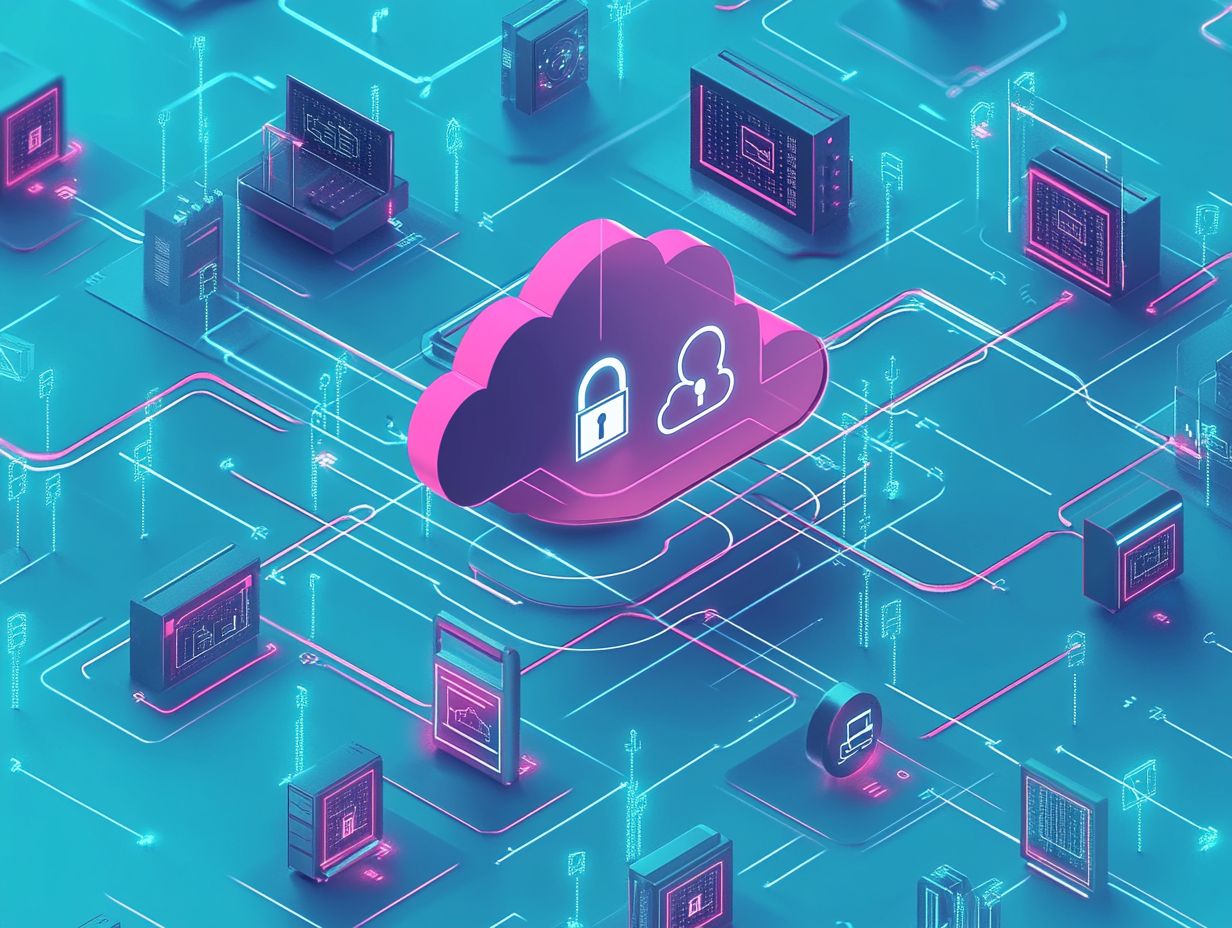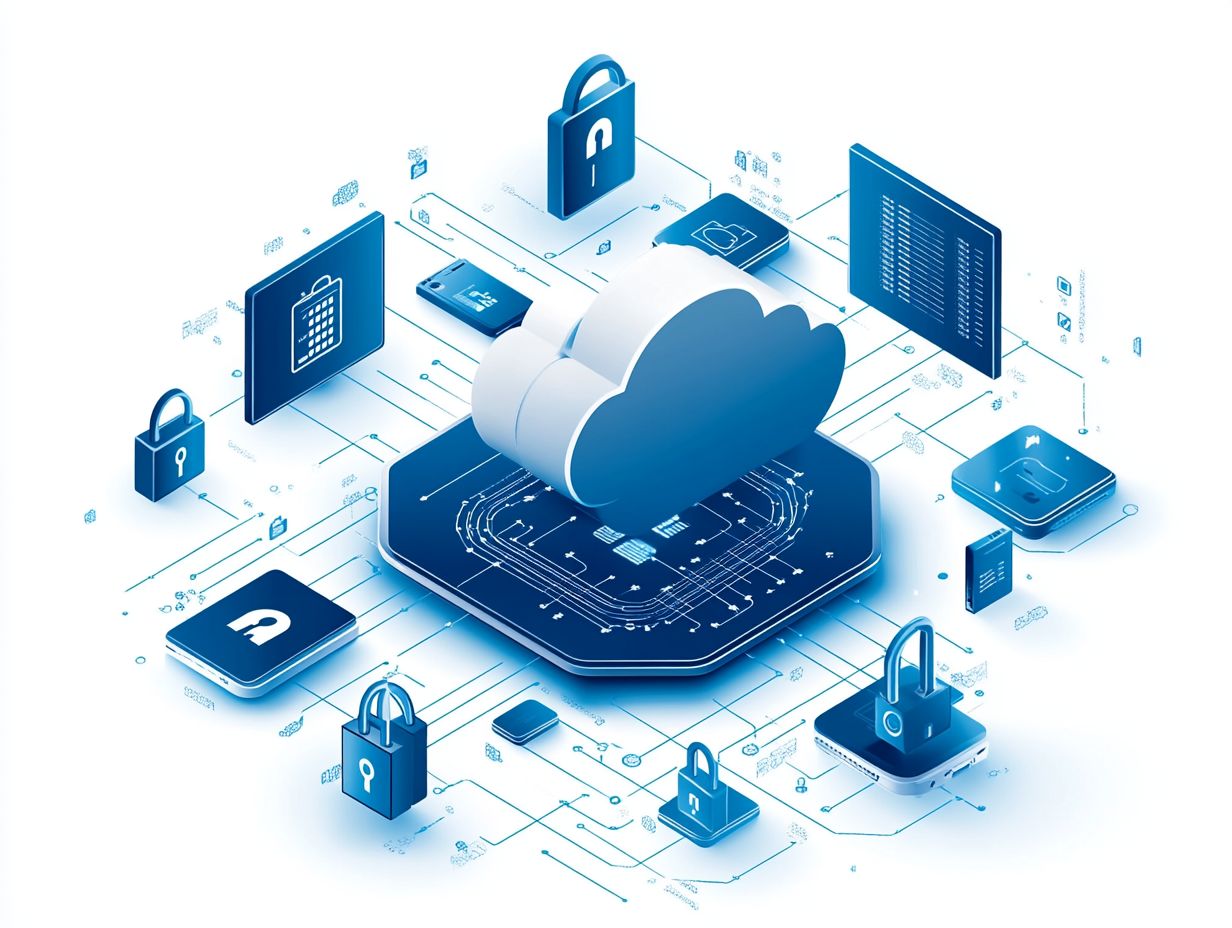Key Technologies in Cloud Security Solutions
In today’s digital world, cloud security is vital for businesses of all sizes. As you adopt cloud services, understanding the technologies that protect your sensitive data is crucial.
This article covers key elements like encryption, identity access management, and network security. These technologies play a significant role in safeguarding your information.
You will also learn about the benefits of cloud security solutions, such as better data protection and cost savings. This knowledge will help you choose the right solution for your organization!
Discover strategies to secure your cloud environment and boost your business s resilience against evolving threats!
Contents
- Key Takeaways:
- Key Technologies in Cloud Security
- Benefits of Using Cloud Security Solutions
- Considerations When Choosing a Cloud Security Solution
- Frequently Asked Questions
- What are the key technologies used in cloud security solutions?
- How does encryption play a role in cloud security solutions?
- What is the purpose of identity and access management in cloud security solutions?
- How does network security protect cloud environments?
- What role does application security play in cloud security solutions?
- How does data loss prevention work in cloud security solutions?
Key Takeaways:

Encryption is a vital technology in cloud security solutions. It protects sensitive data from unauthorized access and ensures data privacy.
Identity and access management (IAM) controls user access to cloud resources. This prevents data breaches and ensures compliance with regulations.
Network security measures, such as firewalls and intrusion detection systems, safeguard data in transit and prevent unauthorized access to cloud resources.
What is Cloud Security?
Cloud security includes a variety of technologies, policies, and controls designed to protect your data, applications, and cloud infrastructure from security threats.
These measures tackle risks related to unauthorized access and data breaches while ensuring compliance with regulatory frameworks like GDPR, HIPAA, and NIST 800-53. These elements are key to maintaining a strong security posture in hybrid and multi-cloud environments.
The importance of cloud security is paramount as your business increasingly relies on cloud applications for critical operations. The potential for security challenges heightens, making effective risk management essential.
Cloud providers play a key role in this security framework. They offer built-in features and incident response capabilities that empower you to protect sensitive information.
With threats evolving at an alarming rate, your responsibility extends beyond compliance. It requires continuous monitoring and proactive updates to your policies that align with emerging risks.
Implementing proper cloud security cultivates trust and strengthens your company’s resilience against cyber incidents.
Key Technologies in Cloud Security
Several key technologies are essential for enhancing your cloud security. They allow you to effectively protect your cloud infrastructure and applications.
These include:
- Encryption for robust data protection
- Identity access management (IAM) tools that give you precise control over user access
- Comprehensive network security measures
- Vulnerability management solutions tailored to identify and mitigate security risks within your cloud environment
By leveraging these technologies, you can create a secure and resilient cloud ecosystem.
Encryption
Encryption is a cornerstone of data security. It transforms sensitive information into a secure format that only authorized users can access with the right encryption keys.
In your cloud applications, robust encryption methods protect your data both at rest and in transit. This significantly reduces the risks associated with data breaches and unauthorized access.
Different encryption techniques play critical roles in cloud security. Symmetric encryption allows for quick processing thanks to its single-key approach. Meanwhile, asymmetric encryption enhances security with key pairs, making it difficult for malicious actors to decrypt your data without both keys.
Cloud providers implement these methods across various environments. They utilize protocols like TLS (Transport Layer Security) to safeguard data in transit and employ AES (Advanced Encryption Standard) for data at rest.
By integrating these encryption strategies into your cloud solutions, you enhance data protection and foster customer trust an essential asset in today s digital landscape.
Identity and Access Management
Identity and Access Management (IAM) is essential for your cloud security strategy. It manages user identities and controls access to cloud services and applications.
With IAM tools, you can enforce strong security policies. This ensures that only authorized individuals access sensitive data and resources, reducing the risk of security breaches.
IAM is crucial for compliance with regulatory frameworks, especially in regulated industries. Implementing strong IAM solutions safeguards your digital assets and shows your commitment to security and data privacy.
Consider common IAM tools like:
- Single Sign-On (SSO)
- Multi-Factor Authentication (MFA)
- Identity Governance and Administration (IGA) systems, which help manage user roles and permissions.
These technologies integrate seamlessly with cloud services. They streamline user management while strengthening your security posture.
By leveraging IAM solutions, you mitigate risks associated with unauthorized access. Keep your cloud environments secure against evolving threats.
Network Security

Network security is vital for protecting your cloud infrastructure. It defends against unauthorized access and data breaches.
It requires a mix of hardware and software solutions to monitor, control, and secure network traffic. This ensures the integrity of data between cloud applications and users remains intact.
Organizations deploy firewalls as vigilant gatekeepers. They filter traffic based on established security rules.
Intrusion detection systems continuously scan for suspicious activities, providing alerts for potential threats. Visibility tools offer insights into traffic patterns and vulnerabilities.
These strategies create a robust security ecosystem, shielding sensitive data from ever-evolving threats. Conduct regular security audits to pinpoint vulnerabilities and ensure compliance with industry regulations.
Vulnerability Management
Vulnerability management is your proactive strategy for identifying and mitigating security weaknesses in cloud environments. It involves continuous monitoring of assets and leveraging security tools.
By conducting thorough vulnerability assessments, you can identify critical areas needing attention. Prioritize effectively to address these vulnerabilities.
Implement robust remediation strategies and maintain an active incident response team to tackle new threats. Keeping your vulnerability database updated helps you stay aware of the latest threats.
This comprehensive approach strengthens your security posture and fosters continuous improvement in risk management.
Data Loss Prevention
Data Loss Prevention (DLP) encompasses the strategies and tools you need to ensure that sensitive data remains secure from loss, misuse, or unauthorized access. This not only protects your information but also helps you comply with various security regulations and standards.
DLP solutions play a vital role in protecting data in the cloud. They monitor and control data transfers effectively.
For example, endpoint DLP protects data on individual devices. It stops unauthorized transfers from personal devices. Meanwhile, network DLP safeguards data during its transmission across networks.
To effectively implement these strategies, you must regularly assess your data protection policies. Ensure they align with regulatory compliance requirements like GDPR (General Data Protection Regulation) or HIPAA (Health Insurance Portability and Accountability Act).
By fostering a culture of awareness around data security and providing adequate training, you can significantly enhance your organization’s ability to safeguard sensitive information against potential breaches.
Security Information and Event Management (SIEM)
Security Information and Event Management (SIEM) systems are crucial for your cloud security strategy. They aggregate and analyze security information from various sources, giving you the power to detect and respond to security incidents in real-time.
SIEM solutions also improve your ability to detect threats and streamline incident response processes. They offer centralized visibility into security events across your cloud infrastructure.
Beyond just log management, which captures detailed records of user activities and system changes, SIEM systems excel in event correlation. This functionality enables you to connect seemingly unrelated data points, identifying potential threats that might otherwise slip through the cracks.
With their alerting mechanisms, SIEMs notify your security teams about suspicious activities instantly. This allows for swift remediation and helps craft a cohesive defense strategy.
By aligning with various security frameworks, SIEM not only helps you comply with regulatory mandates but also bolsters your overall risk management efforts. They are essential in today s ever-evolving threat landscape.
Benefits of Using Cloud Security Solutions
Utilizing cloud security solutions presents a wealth of advantages for organizations. These solutions help elevate data protection strategies, enhance compliance, and adeptly manage security risks.
These solutions deliver robust defense against potential threats. They also foster cost savings and heightened scalability.
This gives you the power to adapt swiftly to evolving demands while ensuring a resilient security framework.
Improved Data Protection

One of the key advantages of adopting cloud security solutions is the superior data protection they provide. This ensures that your sensitive information remains shielded from unauthorized access and security breaches.
By implementing robust security measures and adhering to compliance requirements, you can significantly reduce the risk of data loss. Maintain the integrity of your data.
These strategies ensure your data is well-guarded against threats! Protection is achieved through various strategies, including encryption that secures your data both at rest and in transit, rendering it unreadable to malicious actors.
Stringent access controls further ensure that only authorized personnel have access to sensitive information. This greatly mitigates potential breaches.
Data loss prevention measures play a crucial role. They employ policies to monitor and control data transfer, thus ensuring that critical data is neither lost nor misused.
All these features not only enhance your data security but also align with regulatory standards such as GDPR and HIPAA. Therefore, adopting cloud security solutions is a critical move for your organization!
Start implementing cloud security solutions today to protect your valuable information!
Increased Scalability and Flexibility
Cloud security solutions empower you to achieve unparalleled scalability and flexibility. This allows you to adjust your security measures as your cloud services and infrastructure evolve.
This dynamic adaptability is essential, especially in a hybrid cloud environment. Here, demands can shift rapidly in response to changing business needs.
The ability to scale security resources on demand means you must respond quickly to increased traffic during peak times. This ensures robust protection without interruptions.
Flexibility in cloud security enables the integration of advanced tools that use artificial intelligence to analyze data and spot threats. This continuous assessment helps respond to emerging risks.
In a multi-cloud environment, you can deploy unique security measures tailored to each platform. This optimizes protection across diverse services.
This flexibility keeps your data safe and fuels your growth, allowing you to focus on innovation while effectively mitigating evolving security challenges.
Cost Savings
Implementing cloud security solutions can lead to substantial cost savings for your organization. It minimizes expenses associated with data breaches, security incidents, and compliance failures.
By managing resources effectively, you can optimize your IT spending while ensuring strong security measures are firmly in place.
Leveraging advanced cloud security technologies safeguards sensitive information and prevents costly downtime and reputational damage that often follows breaches.
This proactive approach significantly reduces the risk of financial penalties for non-compliance with industry regulations. Cloud-based systems streamline operations, enabling your IT teams to focus on strategic initiatives.
A well-implemented cloud security strategy protects your assets and enhances overall operational efficiency, driving down costs related to both prevention and remediation.
Considerations When Choosing a Cloud Security Solution
When selecting a cloud security solution, consider several critical factors. This ensures your choice aligns seamlessly with your specific security needs and business requirements.
Key considerations include:
- Compatibility with your existing systems
- The level of support offered by the cloud vendor
- The ability to customize security measures according to your organizational policies
Compatibility with Existing Systems
Ensuring compatibility with your existing systems is paramount. This approach maintains operational continuity while elevating your security posture.
Seamless integration with your current infrastructure minimizes disruption and guarantees effective security measures across all platforms.
In today s digital landscape, where businesses depend on a blend of on-premise and cloud-based applications, compatibility becomes even more critical. Implementing mismatched security measures can create data silos and increase vulnerability.
For example, a well-integrated cloud security measure can effectively protect customer data in a financial institution. Conversely, poor integration could expose gaps that malicious actors are eager to exploit.
Successful technology partnerships between cloud providers and traditional software vendors often provide blueprints for achieving vital compatibility. Ultimately, this collaboration fortifies your organization’s defenses.
Level of Support and Customization

When looking at cloud security, support and customization from vendors are essential. They ensure your organization meets its specific needs.
Good support gives you expert guidance and resources. Customization lets you tailor security policies to fit your needs.
These vendors offer 24/7 technical assistance, proactive monitoring, and regular updates. These are essential for effectively responding to emerging threats.
The flexibility to modify security settings and protocols allows you to align your defenses with regulatory compliance and industry best practices.
With strong support and customization, you can build a tough security system that keeps your data safe. A strategic approach to cloud security not only protects sensitive data but also nurtures trust among clients and stakeholders, creating a secure digital environment.
Frequently Asked Questions
What are the key technologies used in cloud security solutions?
The key technologies used in cloud security solutions include encryption, identity and access management, network security, application security, data loss prevention, and the evolution of cloud security technologies.
How does encryption play a role in cloud security solutions?
Encryption protects data at rest and in transit in cloud environments. It ensures sensitive information is safe from unauthorized access, reducing the risk of data breaches.
What is the purpose of identity and access management in cloud security solutions?
IAM helps control who can access your cloud resources. It prevents unauthorized access and ensures that only authorized users can view sensitive data.
How does network security protect cloud environments?
Network security includes firewalls, intrusion detection and prevention systems, and virtual private networks. These technologies secure network traffic and prevent unauthorized access to cloud resources.
What role does application security play in cloud security solutions?
Application security protects cloud-based applications from malicious attacks and vulnerabilities. This includes measures like code reviews, vulnerability scanning, and web application firewalls.
How does data loss prevention work in cloud security solutions?
Data loss prevention (DLP) prevents the accidental or intentional leakage of sensitive data in the cloud. It involves identifying, monitoring, and securing sensitive data to avoid unauthorized access or loss.
Invest in the right cloud security today to protect what matters most!






